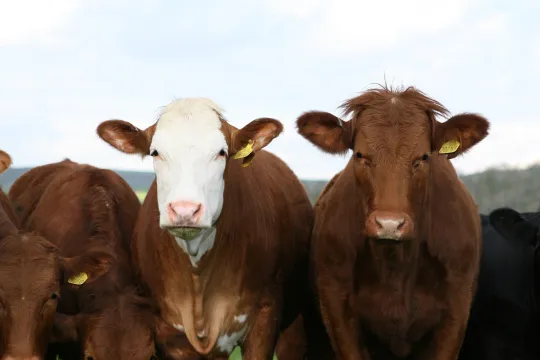Active banners: 0 Visible banners: 0
Agriculture Working Group
Provided by: Wisconsin Initiative on Climate Change Impacts |Published on: January 9, 2024
Articles/Websites
9101112AP
Synopsis
- This resource provides an overview of the impact of agriculture on climate change in Wisconsin and details practices that can support reducing greenhouse gases and increase carbon sequestration on Wisconsin farms.
- The article describes the impact on agriculture from the changing climate while reminding readers that the agricultural sector can sequester carbon in crops and soil and use innovative practices to increase sustainability.
- A working group report linked on the webpage is an excellent resource for diving deeper into specific agricultural practices and their negative or positive effects on climate change.
- While reading this article, students will learn about farming practices such as crop rotation, cover cropping, manure management, and tailored fertilizer application.

Subjects: Biology, Earth and Space Sciences
Authors: Wisconsin Initiative on Climate Change Impacts, University of Wisconsin-Madison
Region: North America, USA - Midwest, United States, Wisconsin
Languages: English
Teaching Materials
Positives
- The webpage concisely reports items of action that can be taken in the agricultural sector, supported by research, to help address the climate crisis.
- The working group highlights the environmental/social justice implications of various agricultural practices, shifting work, and the health of farm laborers.
- The Additional Information section at the bottom of the page has links to excellent videos to help learners understand more about climate change and agriculture.
Additional Prerequisites
- Students should understand agricultural concepts and terms like crop rotation, cover crop, fertilizer, manure, harvest, runoff, and drought.
- Students should understand that agriculture operations have multiple potential sources and sinks for carbon and other greenhouse gases.
Differentiation
- Before reading the webpage, discuss with students where their food comes from and the environmental impact they think food production may have.
- Consider completing a jigsaw activity by breaking students into groups to learn about one impact of climate change on Wisconsin agriculture and then reporting their findings to the whole group.
- Have students make a pros and cons list of the impacts of climate change on Wisconsin agriculture and discuss the contradictory notion that climate change may have local, positive impacts on certain types of farming.
- This resource offers an interdisciplinary opportunity for economics students as they consider some of the economic impacts of implementing climate-smart agricultural practices.
Scientist Notes
Teaching Tips
Standards
Resource Type and Format
All resources can be used for your educational purposes with proper attribution to the content provider.



